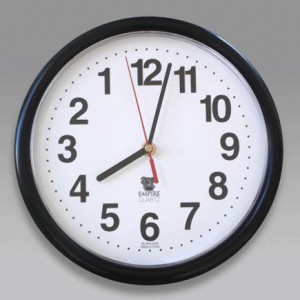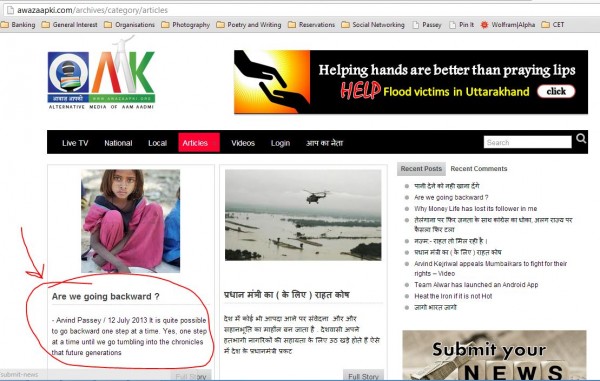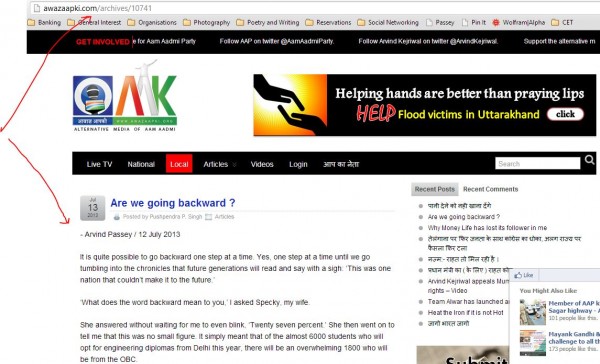It is quite possible to go backward one step at a time. Yes, one step at a time until we go tumbling into the chronicles that future generations will read and say with a sigh: ‘This was one nation that couldn’t make it to the future.’
‘What does the word backward mean to you,’ I asked Specky, my wife.
She answered without waiting for me to even blink, ‘Twenty seven percent.’ She then went on to tell me that this was no small figure. It simply meant that of the almost 6000 students who will opt for engineering diplomas from Delhi this year, there will be an overwhelming 1800 who will be from the OBC.
‘That’s quite a large number,’ I murmured, ‘and if we take the engineering degree seats on a pan-India basis and then add all the other professional and non-professional courses, the number will be enough to astound any social scientist.’
This happens every year.
For the uninitiated, let me say here that the First Backward Classes Commission was set up by a presidential order on 29 January 1953 under the chairmanship of Kaka Kalelkar. There was, at that time, a list prepared that had 2,399 backward castes or communities for the entire country and of which 837 had been classified as the ‘most backward’. I dug deeper and found that one of the recommendations then was a reservation of 70 per cent seats in all technical and professional institutions for qualified students of backward classes. I looked apprehensively at the newspaper lying beside me because the front page was desperately flapping pictures of the pot-holed misery of Mumbai and Delhi. Somewhere inside the paper someone was talking about the incompetence that has infiltrated almost every profession.
I said aloud, to no one in particular, ‘Are we becoming incompetent because of reservations in education and jobs?’
I heard Specky say, ‘No. Reservations were probably conceptualised with the aim of making everyone come to a level playing field. But something went seriously wrong in the years that followed.’
I told her that Kaka Kalelkar wanted women too to be treated as a class as ‘backward’… and so it was probably sometime in the fifties that the cry for reservation for women was born. The reason given was the same… centuries of repression can be washed away only by reservations!
‘But repression isn’t half as bad as reservation,’ I said, looking towards my wife. She simply stared at me with an indulgent smile. She said, ‘You probably need some rest now.’ But I told her that we would not have had the wonderful stories of Eklavya if the Guru had simply admitted him to his school of martial arts. His story of learning from a distance is so inspiring! ‘In fact, I won’t be surprised if some researcher suddenly announces that the distance education courses were actually started by Eklavya,’ I said, ‘though it wouldn’t have been easy trying to device a distance learning set of instructions for expertise in using the bow and arrow!’
We laughed.
After the laughter had suitably faded out, I began, ‘And why just Eklavya… we couldn’t possibly have had a Gandhi if repression was absent. There wouldn’t have been a Martin Luther King if there were no repressed people around. So repression isn’t half as bad as reservation is.’
Specky simply said, ‘I know what you’re trying to get at. Are you trying to say that repression gives humanity thinkers and fighters and reservations give us only incompetent professionals?’
‘That’s an interesting thought,’ I said with a smile and added, ‘I don’t mean reservations are bad so long as they really go to benefit the ones who need it.’ The SC/ST need it because they have been not just repressed but the shunned ones. They have never been a part of the mainstream and reaching out to them through reservations was quite fine. ‘The decline of this mission,’ I said, ‘began when a few others started calling themselves backward and created the OBC.’
‘I have a lot of friends who are Yadavs or Rajputs or Chaudharys and they aren’t repressed by any definition. They’re just out to milk the system dry,’ I said, ‘I know a Lakhera who is an HR consultant and I have on my FB list of friends people who have Jaiswal or Rawat as the surname and who seem to be doing rather well.’
Yes, the world of OBCs is full of intelligent people who have more than most and are enjoying life to the hilt. There are other surnames like Maurya, Lodhi, Gurjar, Quraishi, and Goswami who are surely a part of this gang who just want easy seats in professional colleges and want to go up the ladder of promotions in jobs without wanting to sweat as much as the others.
Specky asked, ‘So OBCs as category must not exist?’
‘No, I don’t mean that at all. All I am trying to say is that I hardly ever see people like Gwala, Badhai, Tarkhan, Bharbhooja, Bazigar, Bhatiara, Mallah, Dhobi, Gadaria, Kasai, Khatik, Kumhar, Luhar, Mochi, Nai, Hajjam, Rangrez, and Sangtarash coming forward to get rid of their backwardness!’ The truth is that these classes of people are the real professionals in our country and we need to reach out to them.
Let’s take a Kumhar (potter), a Mochi (cobbler), and a Nai (barber) from this list and see what they really want and what the world really wants from them. These people have a subliminal inclination towards the finer nuances of the art that their fore-fathers had adopted. They need to be encouraged to take up the right vocational course and learn the contemporary definitions of their art. For instance, a Nai would understand hair-styling and have a love for it. I am not saying that others cannot take up hair-styling… they can and they do and have converted it into an art form. All I’m trying to say is that we must allow the inherent stylist in a Nai to survive instinctively and not emerge out of some inane college course to end up as a half-hearted clerk in a dingy second floor office!
Specky heard me out and then said, ‘So you mean we need to have targeted reservations? A reservation policy where you get benefit only for a course that your name suggests? Wouldn’t that be rather cruel and heartless?’
I told her that according to TOI on 31 August 2010, ‘even after 17 years, at most 7% of seats have been filled by OBCs, regardless of their 27% reservation.’ This simply means that reservations for the ‘Other Backward Classes’ are taking the nation backward. Even those who opt for post-schooling education tend to rise to a level that just frustrates and breaks their will. This policy effectively catapults a Nai, for instance, who has generations of a genetic love for hair-styling, into a tumultuous world of mediocrity from where he is able to neither come back nor take resolute steps forward! We are, in fact, slowly and surely destroying the professional matrix that has existed for ages.
‘This discussion seems to be getting serious,’ I said suddenly.
Specky simply told me that the discussion was moving ahead rudderless and that it was almost getting incoherent. I told her then that it was in December 1980 that B P Mandal submitted a report that concluded that the population of OBCs which includes both Hindus and non-Hindus, was around 52 per cent of the total population. The National Sample Survey found this figure too hard to believe and decided that the correct figure was 32%.
‘Are you aware that the reservation for OBCs is only for the non-creamy layer?’ I asked, and then added, ‘which means, in today’s context, that anyone with a total family income of 6 lakhs and above is not eligible for any reservation.’
The law also states that ‘children of doctors, engineers, chartered accountants, actors, consultants, media professionals, writers, bureaucrats, defence officers of colonel and equivalent rank or higher, high court and Supreme Court judges, all central and state government Class A and B officials should be excluded.’ It goes on to clarify that even the children of MPs and MLAs must be excluded.
Specky said, ‘I know all this. All that worries me though is how the actual beneficiaries never seem to get anything for themselves.’
I read out to her what I found on the Sangh Parivar website: ‘OBCs are well off to take care of themselves like general category. I know that there are poor among so called OBCs and if somebody can do a survey than I wont be surprised to hear that there are almost same number poor in so called General Category. I fail to understand on what basis Ambumani Ramdas, PC Chidambaram, Lalu and Mulayam Yadav call themselves backwards? Something really wrong is going on here. This mindless reservation solely on basis of so called upper and lower caste has to stop. This is stupidity and mediocracy which we are propagating here.’ It is obvious that the policy of reservations of the OBCs is not as innocent as it appears to be. Another article on the internet says that ‘they (OBCs) were actually peasants or working class that didn’t enjoy high social status. They shouldn’t be confused with the dalits or ati-shudras or outcastes. Even OBCs consider themselves much ahead of dalits in social front, at certain places OBCs are known to have suppressed dalits more than other castes did. Though there is an extent of educational backwardness among them, but unlike SC/STs who were prohibited or discouraged for amassing wealth or living in the mainstream, the ancestral businesses and assets like land seem to be serving OBC generations well in many cases.’
Specky insisted that she was still not clear about what I was trying to tell her. She said, ‘All I know is that reservations don’t seem to be having the sort of beneficial effect that they were supposed to have.’
Well, we have had hundreds of years of subjugation of the masses. These repressed classes were intentionally kept backward and higher learning as well as a good life was distanced from them. Reservation for them is almost a necessity where the world surrounding them is dipped in corruption. I said, ‘But I find that reservation for the OBCs has already been hijacked by those who don’t need it at all, which is why I don’t favour it.’
I was silent for a while before I said, ‘We are not going to make it to the future if this goes on. We’re going backward.’
Arvind Passey
12 July 2013
Featured image: Source
Article published in awazaapki.com. Can be read here too.












8 comments
Sakshi Nanda says:
Jul 12, 2013
“Are you trying to say that repression gives humanity thinkers and fighters and reservations give us only incompetent professionals.” – How interesting (and true?) is that! This is the most honest, intelligent and progressive article that I have ever read. And I am not just saying it. Not many have the courage to approach the topic of OBC Reservation with the rationale that you have, and give it permanence by putting it down and sharing with the world. I’m mailing this to all my friends. I’m sure they will be as proud of you as I am. The mornings well begun …
Arvind Passey says:
Jul 12, 2013
Thank you, Sakshi… truth is that I was a bit apprehensive about uploading what I had written. No, not because of fear of any sort but whether readers would really understand what I had written. I do hope there was no ambiguity anywhere. I am glad the article did not finally emerge as meaningless banter!
Diwakar Narayan says:
Jul 12, 2013
Well, the opinions might differ. I once persuaded an OBC guy, who was my friend, to study something better and made use of the reservation that was allocated to them, but he never did it. I am not sure if I am rational, but I think that the population count that is done every 10 years in India should decide who to allocate reservations based on the financial status. I know there might be glitches, but it has to be done somehow. Maybe, those IAS folks can suggest better on this, but we must come up with some good way of figuring out the real situation.
Arvind Passey says:
Jul 15, 2013
The IAS folk can suggest only those things that are politically correct. The decisions in this case will necessarily be politically incorrect to begin with. However, history will praise those decisions. But then we mortals are living in fear of the present…
Rachna says:
Jul 12, 2013
You have put some valid points from both sides. But more than anything else, affirmative action has become a political issue to win votes and to appease certain sections. And totally agree with your point that people who deserve them are hardly getting them. Besides, the discrimination in elite institutes against those coming from quotas is terrible. A complex issue!
Arvind Passey says:
Jul 12, 2013
Yes, the issue is complex indeed and, therefore, a solution is what we must all be actively seeking.
Rickie says:
Jul 13, 2013
What a terrible state of affairs! OBC, ST/SC/General whatever, have we no moral core? How we milk the system with zero regard to nation or its future. Before any policy, even the one of Reservation, is able to do any good, people short circuit them for their petty gains.
You really couldn’t have said it any better. We aren’t going forward. At all.
Arvind Passey says:
Jul 14, 2013
Thank you, @Rickie for agreeing with what I expressed in the article. I was actually a bit worried about how the thoughts in the article would be received.